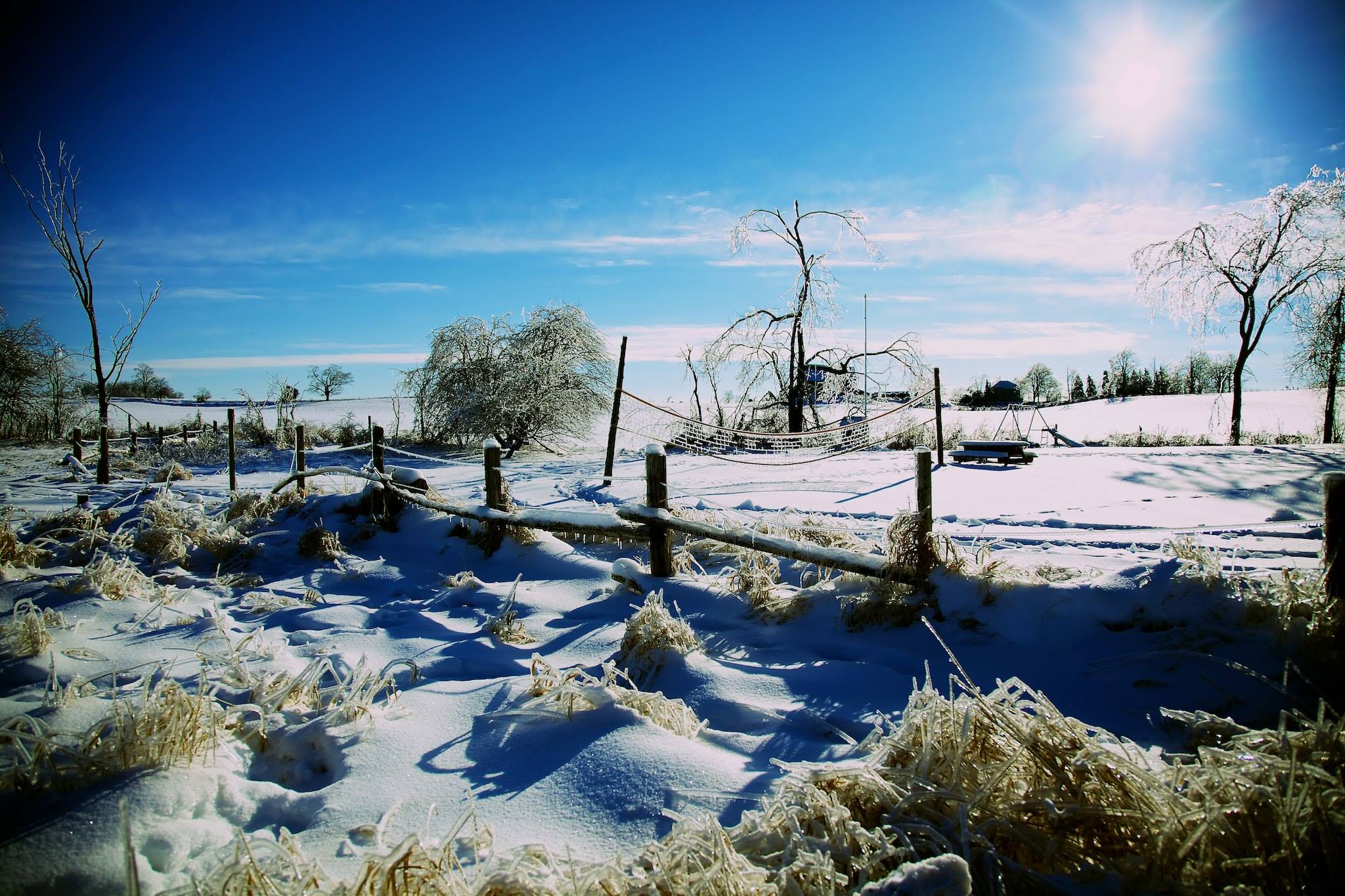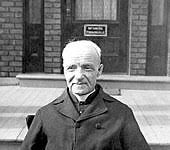Ever seen American Girl dolls? The dolls are based on characters from different time periods and come with long, detailed stories about where they are from and what their lives are like. Addy is from the Civil War period, Caroline is from 1812, and Kit and Ruthie are from the Great Depression. I think if I were one of these dolls, I’d be Sarah from 1856—because that is just about what my Christmas was like.
The ice rain arrived four days before Christmas. Three days before Christmas, there was no power at the homestead—everything was dark, cold, dry (there is no indoor plumbing when hydro is out), and crusted heavily with ice. You could hear trees snapping under the serious weight of the ice and several large limbs were hanging precariously over the power lines outside the house.
Providence had provided my parents with a tank of a wood stove two days before the storm hit, and it had been set up in the basement, one flight of stairs down into the belly of the house. It warmed most of the house, thankfully, but the room downstairs was the coziest. Everywhere else was cool(ish) or even downright cold as you got further and further from the stove. One room we used as our fridge—it was actually colder than the fridge. I would bundle up to visit other parts of the house, and take off my sweaters downstairs. It was a time of great layering.
Cooking on a woodstove is interesting—it’s nothing like cooking on an electric stove. There is only one temperature: hot. Sure, you can fry things and boil stews. You can even make toast on top of a wood stove (who knew?) but everything must be watched carefully or it will burn. And then the pot will melt. The most annoying thing, though, is the problem of light. These days in Ontario, darkness descends around 4:30pm. This means that sometime around four o’clock your eyes begin to tell your brain, “Hey, I can’t see what you’re reading, even though ten minutes ago I could”—and you reach for a lamp.
You really must plan your whole day around this tiny little fact when the power is out. Allowances must be made for cooking, cleaning, and just about everything else you would do after 4:30pm—which seems to be everything. Most of us didn’t go to bed until well after eleven, so that’s a solid six-plus hours of living after the world gets dark. My dad had set up a battery attached to one lamp downstairs by the fire. I spent most of my evenings there, huddled around the light and heat.
And may I just say that there is no real substitute for a single hundred-watt light bulb in a room. Let’s say that one watt represents one candle: a hundred watts would mean there are a hundred little candles spread throughout the room. You can actually see things, see people, find things, and see your surroundings. Light is monumentally helpful (and imperative) when looking for something important like aspirin for a headache or a sweater because you’re freezing. When you only have a candle or flashlight, it makes a difference in trying to locate items. A gigantic difference.
On the first night, I went into my pitch-dark room to find my pyjamas. I was tired of carrying all my stuff in one small suitcase and five small carry-all’s, so this year I had packed absolutely everything in The Behemoth: the largest suitcase the world has ever seen and likely ever will see. It was parked up against the wall in our small room and looked sort of like a big, black hole in the dark. Absolutely everything I pulled out of The Behemoth felt like my pyjamas, including my bathing suit. With only one small flashlight (and one hand), everything looked like my pyjamas, too. I couldn’t see colours; every fabric felt the same; and I had to take each piece of clothing out one at a time. I’m surprised I found anything at all in that black hole, and didn’t end up wearing my Sunday clothes to bed.
You also never really think about how light effects your movements within a house. It’s simple, really, when you’re in the kitchen and need a sweater from your bedroom. You exit the brightly lit kitchen, turn on the hall light, walk down the hall into the bedroom, turn on the bedroom light, locate the sweater, and then do everything in reverse. When there is no power, this is how things go:
- Leave the (somewhat) lit kitchen.
- Get halfway to the bedroom before you realize there will be no light in the bedroom.
- Go back to the kitchen.
- Locate a light source that isn’t in use (always hard to find).
- Head back to the bedroom.
- Forget what you needed in the bedroom.
- Go back to the kitchen.
- Remember what you needed, and go back to the bedroom (WITH light source).
- Spend ten minutes finding a sweater with one hand, or figure out a way to prop up the ridiculously lopsided and un-proppable flashlight in the direction you need the light.
- Return to the kitchen only to realize you left your book in the bedroom.
- Repeat steps 1-11.
I can’t tell you how many times I did this. It’s embarrassing, really. I can honestly see why Sarah from 1856 would just go to bed when the sun went down. It’s bloody exhausting trying to find stuff in a dark house. The power was finally restored on 27 December, a mere six days after it went out, and the people in darkness saw a great light. Alleluia. We stepped back into 2013. Showers were had. Dinner was put in the oven. Emails were sent assuring all of our survival.
I’d love to say that Christmas 2013 brought us back to a simpler time and made us all appreciate the more important things in life. I suppose it did. But before you feel too sorry for us I must disclose that my dad has a generator, which we used off and on during the power outage. It’s not a large one, so we used it only for small appliances like the freezers, as well as for light and computer usage. We were like pioneers. With a generator. And high speed. But the power outage certainly did simplify Christmas dinner. The turkey and a few potatoes were cooked at a friend’s place, and my siblings brought the rest. The Christmas Feast was eaten off paper plates as the hot water tank sucks too much energy to be run by the generator and technology was noticeably absent from our family get-together. What did we do without everything that hydro brings with it? We talked. We ate. We laughed. It was all very memorable.











